QUANG BINH, Central Vietnam - As a stark reminder of the Vietnam War's deadly legacy around the day one of its chief American architects dies, six people in central Vietnam were killed in two separate bomb explosions.
Former Defense Secretary Robert S. McNamara, who has been criticized for escalating the war in Vietnam during the Kennedy and Johnson administrations, died on July 6 at the age of 93.
On July 4 and 6, accidents involving ordnance from that war occurred in Quang Tri and Quang Binh provinces on both sides of the former demilitarized zone that once bore his name: the McNamara Line.
In Quang Tri province on July 4, Tran Long, age 35 was found dead by a small crater formed in the sandy land of Trieu Son commune. A short distance away, Nguyen Diem, age 39, had been also been injured in the explosion and died in transit to the hospital. These two men left behind wives and five children.
Just two days later, at 7:30 pm local time in Quang Binh Province on July 6, another war era bomb, weighing 500 pounds, was disturbed and detonated taking the lives of four men.The eldest was 30 years old, and the other three just 25. Three of the men were married with small children.

Tran Long's son at his father's funeral.

Tran Long's Widow
A Dangerous Job
All six men were killed while performing the same type of work - collecting scrap metal. Briefly described, scrap metal collectors use metal detectors, wandering through sandy areas once occupied by military installations or weaving through thick vegetation to reach areas which were once regular targets for massive B52 bombing raids. They look for anything made of metal - a rusty chunk of steel from a broken bomb case, a corroded brass ring from a rotating band of a projectile, or a smashed-up aluminum fin tail off a mortar round. Everything is picked up. At the end of the day, it is sorted at scrap dealer shops. Steel goes with steel, brass with brass, and cash is paid by the weight.
 Scrap Metal Collected from the former Battlefields of Vietnam
Scrap Metal Collected from the former Battlefields of VietnamDinh Manh Hung, 26, was the only one among the six men who had a stable job as a secondary school teacher. He had been teaching chemistry for two years. However, as it was summer vacation, he wanted to earn additional income during his off time. The other five men were all farmers. They had their land to cultivate rice and other secondary crops. At home their wives raise animals. However, they still had available time after doing farm work. As the family demand for income was high, they found themselves spending more time in the woods digging up metal rather than tending their crops. In fact, their side job sometimes brought in more income than what the crops could provide.
At Tran Song Hao's home a deep search metal detector was seen. In other corners of the house there were piles of metal junk collected earlier, most of them large, thick fragments of bombs. Hao was not only a scrap metal collector; he was also a scrap metal dealer.
Time and experience taught these men skills for this job. The four men involved in the second accident knew where to search for metal junk on the Ho Chi Minh trail, the main supply line of the North Vietnamese which traversed their homeland. This network trail had been a regular target for B52 bombardments. When a heavy bomb is dropped from a high altitude, it often makes a deep penetration. When it explodes, some of the fragments make another penetration into the sides of the crater. This is especially true if the bomb uses a base fuse, causing the explosive train to travel from the tail to the nose of the bomb, pushing most of its fragments (parts of its steel case) deeper into the ground of the crater. Understanding this process, the scrap metal collectors find bomb craters, check them with deep search metal detectors, and dig up the metal fragments.
Earlier in the day, the metal detector emitted strong signals deep from the center of a crater. The men decided to wait for the sun to go down to avoid the heat. They got back to the site at 6:30 pm to start the excavation. None of them could believe that long before any of them were born, a complete bomb made its way deep inside the crater but failed to explode.
TO LIVE BY THE SWORD AND DIE BY THE SWORD
I knew Tran Long well before his fatal accident. In July 2005, CPI responded to a new accident. A young man had been injured while digging up scrap metal for his livelihood. I went to the Quang Tri general hospital to visit and interview the survivor. It was our first meeting. Long survived from that accident when the tiny piece of metal he picked up exploded. The blast took away four fingers on his left hand. We had a very open conversation, and I learned that he had just spent a fortune, several months of his savings, to purchase a deep-search metal detector.

Tran Long in treatment for losing his fingers in a previous accident.
As I said goodbye to Long after our conversation in 2005, I thought he had learned a hard lesson and that the loss of his fingers would remind him of the risks. I was positive that his wife would also persuade him to find safer work.
I was wrong. I never would have thought that four years later I would meet him again in a totally different situation. He is no longer in this world.
The fatality accident site was approximately 12 kms from their village. Both men traveled there by motorbike, taking along their work equipment. Diem took the lead with the detector, searching for signals, while Long followed him to excavate. The explosive was subsurface. When it exploded, Long received the direct hit of the blast. Duan received only one injury. A fragment entered his body in the back, exiting from his chest.
 Blast area where the men lost their lives.
Blast area where the men lost their lives.CONSEQUENCES
Five out of the six families have children. The oldest one is ten years old; the youngest one is still being breast-fed. All together, 8 children lost their fathers forever. I doubt if any of them are fully aware of the loss for they are all still innocent children, too small to understand.
Contrary to the innocent children are the exhausted, worried, grievous faces of the five widows and an old mother. They have all just lost a sole provider. In the long road ahead they will be struggling on their own. From now on, they must shoulder not only a mother's role but all other roles and responsibilities left by their husbands.

 is until he made a bad call and lost his right hand.
is until he made a bad call and lost his right hand.
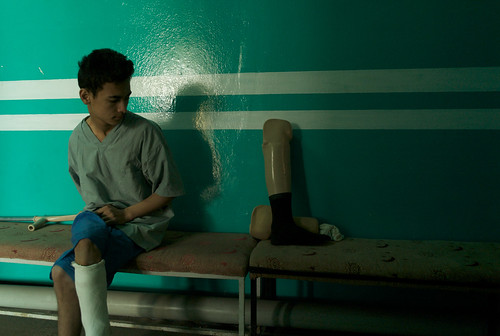



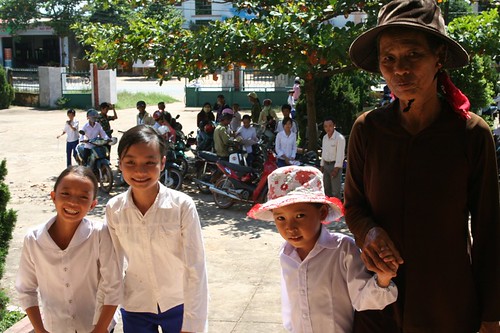

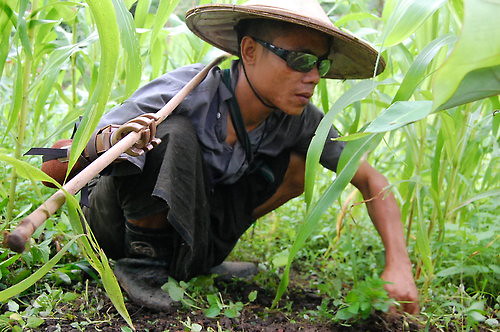
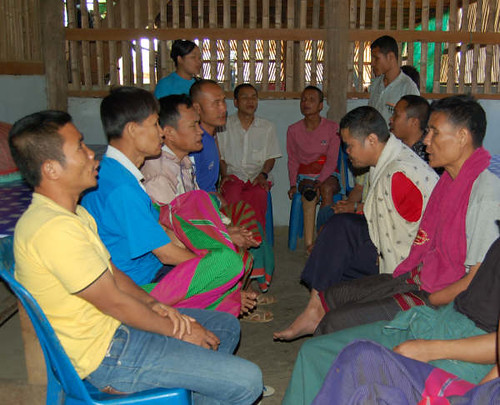
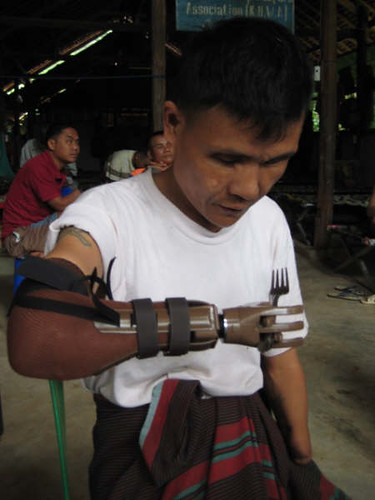











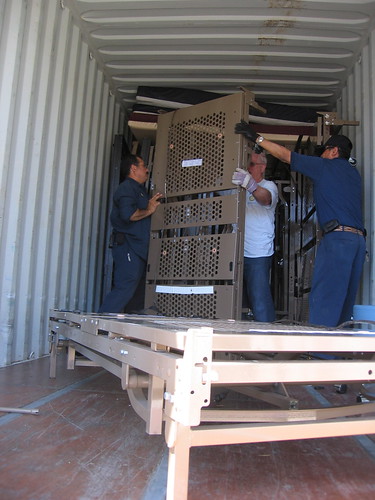
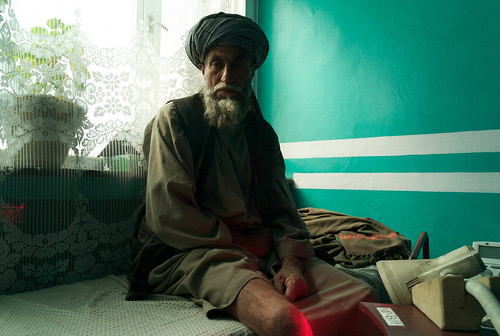
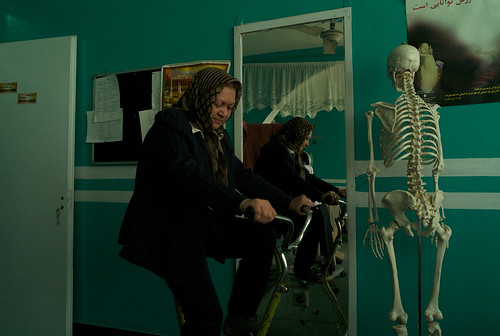
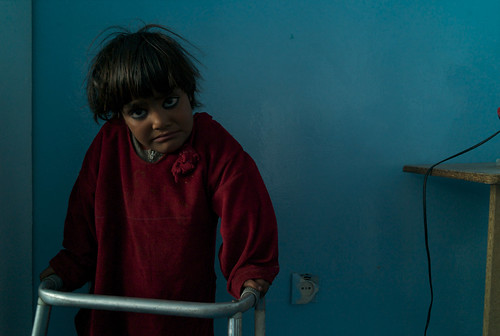
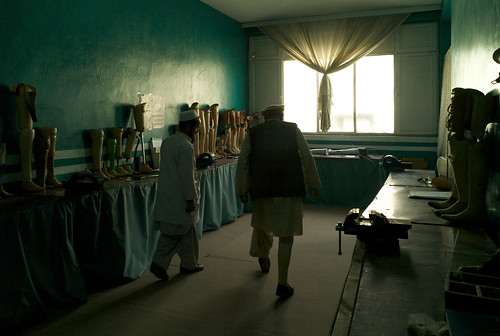
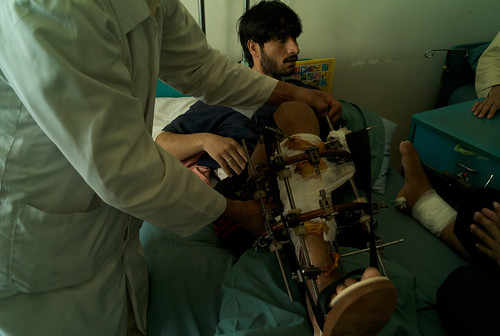

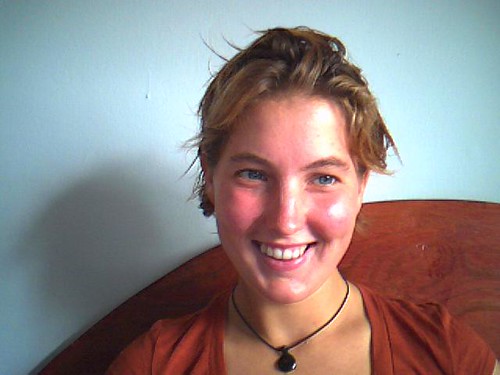
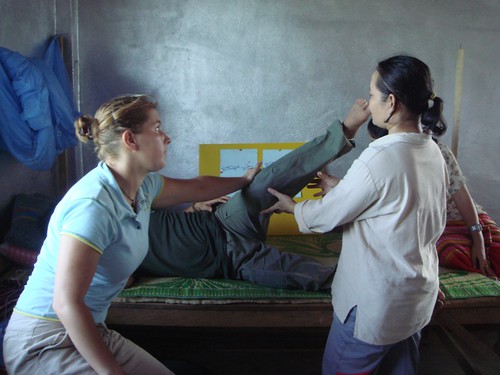


![Hanh_in_the_field_11[1]](http://farm4.static.flickr.com/3547/3313220246_89bb3ab55b.jpg)
![hanh_in_EOD_training[1]](http://farm4.static.flickr.com/3353/3312392237_e8f6620399.jpg)
![Duy_in_training[1]](http://farm4.static.flickr.com/3520/3312392191_6ea2a3b088_o.jpg)

 KABUL, Afghanistan � A steel landmine probe. A deminer�s trowel. A flail hammer. Mine field marking tape. Newly polished safety visors. These tools may not sound familiar to you, but mine clearance professionals use them every day.
KABUL, Afghanistan � A steel landmine probe. A deminer�s trowel. A flail hammer. Mine field marking tape. Newly polished safety visors. These tools may not sound familiar to you, but mine clearance professionals use them every day. That wasn�t the case with Zab Mohammed whom I met in the civilian post-op ward at the military hospital in Kabul. My encounter with the 18-year-old simply pulled out the rug.
That wasn�t the case with Zab Mohammed whom I met in the civilian post-op ward at the military hospital in Kabul. My encounter with the 18-year-old simply pulled out the rug. That would be a blessing to Fazal Mohammed. The 20-year-old was injured by a suicide bomb attack that set off a landmine while he was waiting with other young men for construction jobs in Jhore Province six months ago. His spine was fractured and he is no longer expected to walk. KOO gave him full-leg orthoses. When I met him and his brother there, he was relearning to stand using the parallel bars. It took the pair 36 hours to get from their adobe village to Kabul by car. They had to rent a special bus because Fazal had to lie flat during the trip. The cost exceeded $350, a fortune in Afghanistan. He�s going home with crutches, a wheelchair and a slew of physical therapy exercises. He hopes to become a shopkeeper at some point but it may be as a single man. His fianc�is not so sure about the wedding anymore. Yet in the midst of telling me his tragic story, he managed to grant me a smile. He hadn�t lost all hope.
That would be a blessing to Fazal Mohammed. The 20-year-old was injured by a suicide bomb attack that set off a landmine while he was waiting with other young men for construction jobs in Jhore Province six months ago. His spine was fractured and he is no longer expected to walk. KOO gave him full-leg orthoses. When I met him and his brother there, he was relearning to stand using the parallel bars. It took the pair 36 hours to get from their adobe village to Kabul by car. They had to rent a special bus because Fazal had to lie flat during the trip. The cost exceeded $350, a fortune in Afghanistan. He�s going home with crutches, a wheelchair and a slew of physical therapy exercises. He hopes to become a shopkeeper at some point but it may be as a single man. His fianc�is not so sure about the wedding anymore. Yet in the midst of telling me his tragic story, he managed to grant me a smile. He hadn�t lost all hope.